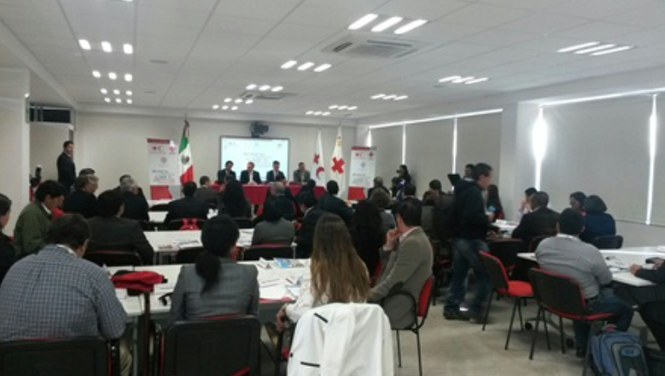
“We have an important responsibility to protect our peers, and disaster law is an essential tool to build greater resilience in the face of the threats in the Americas region,” affirmed Lic. Rogelio Conde García of Mexico’s civil protection office, during his opening remarks at the Consultative Meeting on Disasters and Law at the Mexican Red Cross Capacity-Building and Training Center (CENCAD) in Toluca on November 13-14.
The consultative meeting, co-organized by the International Federation of Red Cross and Red Crescent Societies, the Mexican Red Cross and Civil Protection Mexico gathered representatives from more than 20 countries in the Americas region, National Red Cross Societies, international organizations, donors and experts in the fields of law, international humanitarian assistance and disaster risk reduction.
The main goal of the encounter was to explore, discuss and consult measures to promote a faster adoption of the procedures aimed at managing international assistance in the event of a disaster, including the eventual adoption of a new global treaty.
For Jan Gelfand, Head of Programs and Operations for the IFRC’s “Zone” Office for the Americas, it was a reflection of a “technical character but a political end”.
After a day and a half of reflections, it was evident that important gaps still remain regarding legal preparation that make it difficult to manage the international response in the event of a disaster in the region. “Despite the progress that has been made at the national and regional levels, rad tape in some areas and oversight gaps in others continue feeding bottlenecks in international response. These weaknesses directly impact the provision of international assistance, the ability of domestic authorities to retain overall control of the operation and, of course, the experience of affected persons,” noted David Fisher, Global Coordinator of the IFRC Disaster Law Programme.
Preparing for large-scale disasters and facilitating international assistance is an exercise that lies mainly within the responsibility of states. Dr. Eduardo Valencia-Ospina, special rapporteur of the UN’s International Law Commission’s project on the protection of persons in the event of disasters and former Secretary of the International Court of Justice, noted that “national legal realities vary, both in their constitutional roots as well as in their legislation. We must also keep in mind that political issues could limit progress regarding these matters. Therefore, the development of a treaty would benefit harmonization and provide guarantees for the rights of those affected by disasters in the framework of such assistance. In any case, we are promoting a framework for regulating and channeling the solidarity among States affected by disasters, without losing sight of the rights related to it”.
Participants speaking at the meeting agreed that a global treaty would add significant value and should be discussed at the next International Conference of the Red Cross and Red Crescent in 2015 and at the World Humanitarian Summit in 2016.
The Consultative Meeting in Toluca also offered an opportunity to share opinions on “Checklist on Law and Disaster Risk Reduction.” This tool currently under development by the IFCR and UNDP aims to offer policymaers and their supporters at the national, provincial and municipal levels a clear path to assessing whether their current legal frameworks are pulling their weight in terms of reducing risks.. According with Fernando Cárdenas, President of the Colombian Red Cross, the tool will “allow us to keep in mind all the features that a good legal framework on disaster risk reduction should have.” For Bernado Castro, Chief of the Cabinet of the National Office for Emergencies of Chile (ONEMI) this instrument “will be very useful at national level and will help to increase the knowledge in order to produce better laws on this matter”.
Participants also emphasized that the development of holistic legal frameworks, the preparation of mandated budgets to accompany these developments, the creation of regulations with inter-sectoral and inter-institutional features, the promotion of education on risk reduction and the involvement of communities must be taken in consideration, both in national lawmaking and in the text of the new global framework on disaster risk reduction to be adopted at the World Conference on Disaster Risk Reduction in Sendai in 2015.